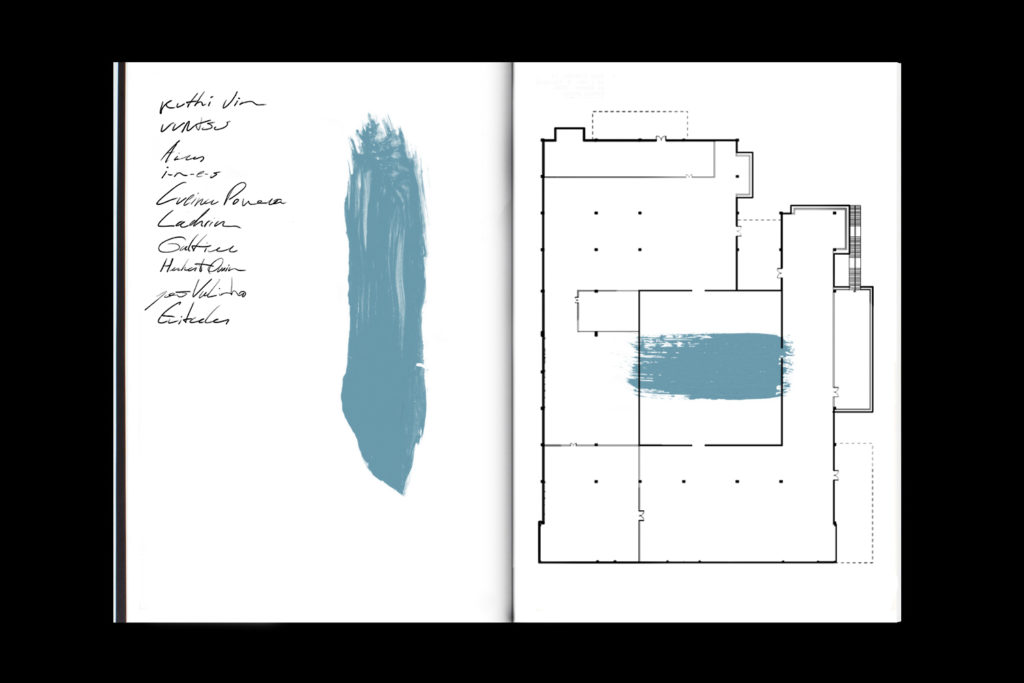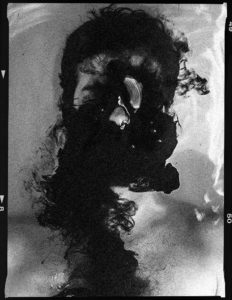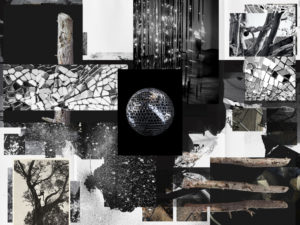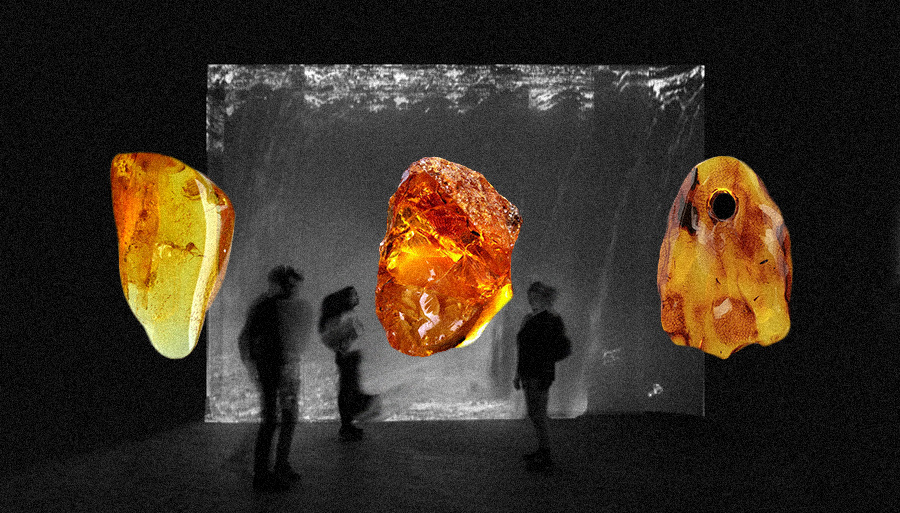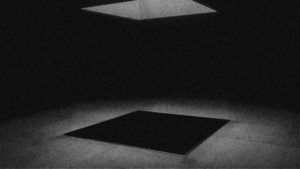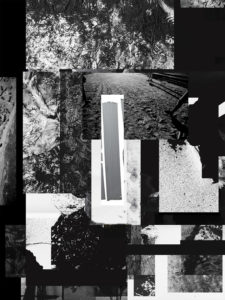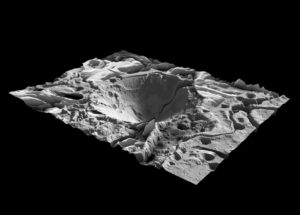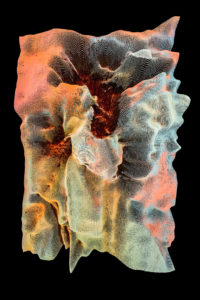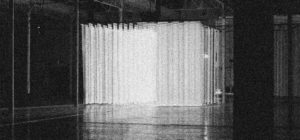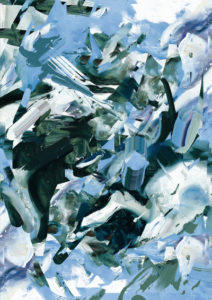INTERCEPÇÃO is Portuguese label ZABRA’s 10th release, although here the term “release” feels almost diminutive. Indeed, the compilation is more akin to a gallery exhibition in its own right and the stage certainly has been set for one: 10 musicians have been invited to compose over a slew of fictional artworks, hybridized through a curatorial practice of stolen, found, and appropriated images. These images, pulled out of their original contexts and reshaped through juxtaposition and manipulation harken back to theories of re-contextualization and piracy, such as Hito Steyerl’s In Defense of the Poor Image and John Oswald’s plunderphonics.
Additionally, the music is dispersed throughout a fictional art gallery, presented here as a floor plan, rendering the work an experience to witness in situ.
Shedding all narrative concerns, João Pedro Fonseca’s curation sets a fresh plane on which these 10 musicians lay-out their inter-sensorial interpretations of the fictitious artworks.
Starting off the record, Lachrin’s “Postene Me Audire” introduces the release with a creeping slow-phased string duet that incrementally builds its harmonics over the soothing soundscape they produce. Lachrin establishes a wondrous synergy with the given visual and textual cues, here a book excerpt about our ever-looming mortality and a muted video piece of a person, laid down underwater, slowly exhaling black ink clouds. We’re introduced to noise elements halfway in that accompany the strings in this continuous sonic expansion, which culminates in a loud, powerful, and cinematic rumble.
Presented with a fragmented collage of mirrors and nature, Aires tackles the theme appropriately with a sustained drone interspersed with equally fragmented granular details before an explosive glitch shifts to a repeating plastic dance sequence, over which dramatic stereo gestures are applied. The dynamic stereo manipulations peel off the thick bewitching beat, momentarily revealing the initial drone sustaining quietly in the background, followed by a moment of stability for us to enjoy the dance sequence.
“Faith Thirst Glitter Alone” sonically imitates the manner in which the accompanying artwork is read: the eyes scout the collage as a whole, engaging with the visuals as a wall, before lulling one’s mind into focusing on the details, interrupted only by the seams of the different pictures, temporarily bringing the attention back to the piece as whole.
INTERCEPÇÃO lightens up with a break from complex instrumentals with the refined “Resin.”
Bowing before the permanence of resin, a material that faces us with the transience of our times, Cucina Povera tackles the thrall of time with a soothing undulating vocal tapestry interjected with a ceremonious sung performance. On top of the organicity of the sound piece is a droning hollow hit, imitating the methodical 2-step swing of a clock pendulum, thus completing the picture painted by “Resin”: a giant cathedral, filled with still air and resin coloured sunbeams, hosting in its altar a small chamber-sized gospel devoted to praising the eternal and the temporal, accompanied only by the pendulum swing of a nearby floor clock.
Although simple on first listen, Cucina Povera’s Resin makes efficient use of the 3 acoustic elements to render a powerful and sublime image.
Provided with a visual documentation akin to minimalist art of the 60s à la Hans Haacke, Galtier delivers an aptly atmospheric track on the release. Starting with a low buzzing drone, Galtier imparts a sci-fi flair to the track while intervening with infrequent acid kicks and paranoid muttering far off in the distance of the stereo landscape. Small breakaway gestures make an appearance in the track before resuming its previous pace, only this time with a lot more unique sample interventions that reinforce the mechanical feel of the piece. Listening to “Fog Containers” feels tense and not unlike being exposed to a rising Shepard tone. The track leaves the listener with a sense of anxiety and an imagined paranoia, hauntingly and beautifully so.
In a similar fashion to Aires’ “Postene Me Audire,” Evitceles works off a black and white collage, however this one focuses more on materiality in a way that feels like the 70’s sculptural obsessions. In a tactful answer to this prompt, “Coil Dialogue” draws upon New Age instrumentation for its ambient soundscape, and certainly New Age pacing, with frivolous pan flutes and enduring filtered pads. Evitceles spices it up with automaton-like chirping, a discreet straight 1/16th hi-hat pattern, and most prominently, a vocal dub which echoes and races back and forth.
Moving forward with a surprising palate cleanser, INTERCEPÇÃO introduces VVTNSS’s contribution, pacing the album excellently. The track’s light, enjoyable sparseness of small vocal micro sampling is bound together with pads, breaths, and freshly unique interventions., which reflects Regression’s source visuals of lunar barren landscapes and performance art. Deconstructed vocals are laid bare with careful splicing, answered by mechanistic brouhaha and decisive piano contrapunto. Sewn with threads of voluminous reverb, oscillations, and judicious timing, VVTNSS’s “Regression” is a sonic garment with grand and evocative powers.
Continuing in a similar vein as Cucina Povera, i-ne-s comes into this lineup as, perhaps, the truest visual art veteran to this conceptual project insofar as she works as a performance artist with an emphasis on sound integration. It certainly can be heard in her stylistic choices, approaching the track with a raw, poetic, and closely mic’ed voice-over. With performance art experience comes a greater concern for gestural qualities in art, whether visual or audible, and i-ne-s definitely nails gesturality down with subtle modulation on “Oxidized’s” vocals, acting as emphasis on the lyrical content.
The sound piece goes on with organ accents that feel quasi-accidental, but to quote i-ne-s on this track: “everything was measured,” implying that they synergize with the vocal morphing. Incrementally, the narration degrades into senseless warping, a diegetic reflection of the theme provided to the artist, while the instrumentation enriches itself to a fully fleshed-out harmonic weaving. Warmth at the forefront, with grainy faux-vintage pads and inexact choirs, “Oxidized” is an intimate tour de force.
Winding down cautiously towards the end, INTERCEPÇÃO engages with its first of two noise-oriented tracks, namely KuThi Jin‘s “Foreign Crate.” With “nature as the first broadcaster” as a textual cue and a wall of loudspeakers for the visual one, KuThi Jin attacks the concept with a feedback heavy vision, offering the listener hyperactive dynamics and appropriate walls of noise as a diegetic response to the cues. Easing the release into its harsher section, “Foreign Crate” brings forth spectral resonances, low undulation, syncopated samples, ghost-like radio static, and rhythmic chopping. With a surprising twist, the track ends on a nod to post-trap with ring filtered vocals erring about wistfully.
The second noise track, “Untitled”, is met with a pop art sense of irony and pop culture desecration. Opening on a sample sourced from commercial media, the track proceeds to compose continuous blathering with the same kind of sampling, adding a comedic wink at times where it’s intelligible (“Ariana Grandeeeeeee” shouts one announcer), before crushing the stream of media with ironic sidechain that over-compresses the whole down to a noisy thump. Bliss Currency allows for a small pause mid-song before cutting off all pop radio samples and focusing purely on intense noise, driven by plate resonances.
Closing off this spectacular ZABRA release, Herbert Quain’s documentation quotes Marienbad, and whether it refers to Last Night at Marienbad or to post-war Mariánské Lázně does not matter much as both are plausible with these visuals of beautiful European palace ruins, shot in the same way as Tarkovsky’s Stalker. “Fitting Boxes” provides an air of hauntology, evoking nostalgia of lost futures and the pain of destroyed pasts with a beautiful and soothing piano loop, juxtaposed with a layer of turntable dust grain. The track progresses with gusto in its dramatization of orchestral samples, one of which is a tongue-in-cheek strings sample reminiscent of the Y2K’s sense of drama.
The track then reaches a moment of lucid clarity before sinking back into shadowy echoes, serving judiciously as the outro of the visitor’s journey through the staged exhibition, INTERCEPÇÃO.
by Hakeem Lapointe.
INTERCEPÇÃO is out now on ZABRA Records. Purchase it here.

